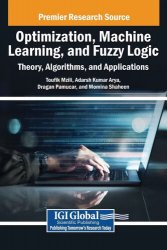Optimization, Machine Learning, and Fuzzy Logic: Theory, Algorithms, and Applications
- Добавил: literator
- Дата: 25-04-2025, 15:00
- Комментариев: 0
 Название: Optimization, Machine Learning, and Fuzzy Logic: Theory, Algorithms, and Applications
Название: Optimization, Machine Learning, and Fuzzy Logic: Theory, Algorithms, and ApplicationsАвтор: Toufik Mzili, Adarsh Kumar Arya, Dragan Pamucar, Momina Shaheen
Издательство: IGI Global
Год: 2025
Страниц: 620
Язык: английский
Формат: pdf (true), epub
Размер: 39.0 MB
Optimization, Machine Learning, and fuzzy logic are fundamental in the field of Computational Intelligence (CI), each contributing to solving complex problems across various domains. Optimization techniques focus on finding the best solutions to problems by improving efficiency and minimizing resources. Machine Learning enables systems to learn from data, making predictions or decisions without being programmed. Fuzzy logic deals with uncertainty and imprecision, allowing for flexible decision-making processes. Together, these theories, algorithms, and applications solve challenges in fields such as engineering, finance, and healthcare, where traditional methods often fall short. The continued application and exploration of these disciplines may unveil new possibilities for advanced problem-solving and intelligent systems.
Optimization, Machine Learning, and Fuzzy Logic: Theory, Algorithms, and Applications explores optimization techniques, fuzzy logic, and their integration with Machine Learning. It covers fundamental concepts, mathematical foundations, algorithms, and applications, providing a holistic understanding of these domains. This book covers topics such as disease detection, Deep Learning, and text analysis, and is a useful resource for engineers, data scientists, medical professionals, academicians, and researchers.
Machine Learning, a cornerstone of AI, has revolutionized industries and technologies, empowering systems to adapt without direct programming. This abstract delves into the foundational principles of machine learning, elucidating the paradigms of supervised, unsupervised, and reinforcement learning. Supervised learning involves the task of training models on datasets, where each input is associated with a corresponding output. Unsupervised learning diverges from supervised learning by operating on unlabelled datasets, endeavouring to discern inherent structures and patterns autonomously. Principal component analysis (PCA) and other dimensionality reduction methods, such as K-means clustering algorithms, and association rule learning methods uncover latent insights within unannotated data, empowering data-driven decision-making. Reinforcement learning adopts an interactive paradigm, wherein agents navigate environments to accomplish predefined objectives.
Deep Learning aims to minimize the loss during learning the training set parameters essential to meet the objective. In supervised learning method a data set and respective outcomes are given to the model. The model compares the generated output with its desired output, takes the difference between them and tries to produce the final output close to that of the desired output. Applying Deep Learning models requires design and optimization when solving multifaceted Artificial Intelligence tasks. Optimization aims at minimizing the loss function where as Deep Learning aims at finding a desired model for the given set of data. Training a Deep Learning model may take hours, days or weeks. The efficiency of training model is directly depends on the performance of optimization algorithm used. Deep knowledge on the basics of optimization algorithms and their hyperparameters enable the designer to improve the performance of Deep Learning model modifying the hyperparameters as per requirement. Hence, solving optimization issues in process automation has evolving as a real-time problem.
Coverage:
The many academic areas covered in this publication include, but are not limited to:
Algorithms
Artificial Intelligence
Computer Engineering
Data Science
Deep Learning
Disease Detection
Fuzzy Logic
Machine Learning
Medical Prediction
Soil Quality Prediction
Text Analysis
Скачать Optimization, Machine Learning, and Fuzzy Logic: Theory, Algorithms, and Applications
[related-news] [/related-news]
Внимание
Уважаемый посетитель, Вы зашли на сайт как незарегистрированный пользователь.
Мы рекомендуем Вам зарегистрироваться либо войти на сайт под своим именем.
Уважаемый посетитель, Вы зашли на сайт как незарегистрированный пользователь.
Мы рекомендуем Вам зарегистрироваться либо войти на сайт под своим именем.
